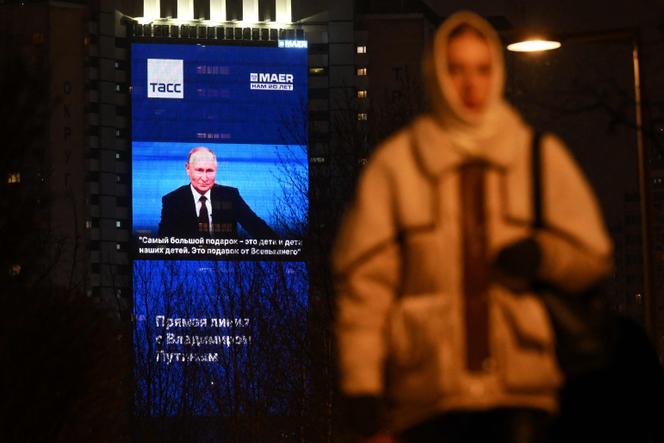


Russian President Vladimir Putin said Thursday, December 14, that there would be no peace in Ukraine until the Kremlin realizes its goals, which remain unchanged after nearly two years of fighting. Speaking at a year-end news conference that lasted over four hours and offered him an opportunity to reinforce his grip on power, Putin gave some rare details on what Moscow calls its "special military operation."
He dismissed the need for a second wave of mobilization of reservists to fight in Ukraine – a move that has been deeply unpopular. He said there are some 617,000 Russian soldiers there, including around 244,000 troops who were called up to fight alongside professional military forces. "There will be peace when we will achieve our goals," Putin said, repeating a frequent Kremlin line. "Victory will be ours.
Putin highlighted Russian military gains in Ukraine as the conflict's second winter approached. "Almost all along the line of contact our armed forces, let's put it modestly, are improving their positions, almost all in an active stage of action and there is an improvement in the position of our troops all along," he said. "The enemy has declared a big counteroffensive, but he hasn't achieved anything anywhere," Putin added, claiming that the latest Ukrainian attempt to create a bridgehead on the eastern bank of the Dnieper River also fizzled and Ukrainian troops suffered heavy losses. "There is enough for us not only to feel confident, but to move forward," Putin added.
Putin alleged that Kyiv was sacrificing its troops in order to show some success to its Western sponsors as it seeks more aid. "I believe it's stupid and irresponsible on behalf of the country's political leadership, but it's their business," he said.
Putin, who has held power for nearly 24 years and announced last week he is running for reelection, was greeted with applause as he arrived in the hall in central Moscow. He didn't hold his traditional news conference last year after his military failed to take Kyiv and as the Ukrainian army retook territory in the east and south.
But with Ukrainian President Volodymyr Zelensky forced to plead for more US aid amid a stalling counteroffensive and fracturing Western support, he decided to face the media once more.
It was the first time that Putin, who has heavily limited his interaction with foreign media, faced questions from Western journalists since the fighting in Ukraine began. Ordinary citizens had the chance to submit questions alongside those from journalists, and Russian state media said at least 2 million of them had been sent in ahead of time.
The news conference began with questions about Ukraine and highlighted concerns some Russians have about another wave of mobilization. "There is no need" for mobilization now, Putin said, because 1,500 men are being recruited every day. As of Wednesday evening, 486,000 soldiers have signed a contract with the Russian military," he said.
Putin's remarks about another wave of mobilization were met with skepticism by some independent Russian media, which pointed out that he had promised not to draft reservists for Ukraine and then reversed course and ordered a "partial" call-up. The move, which he announced in September 2022, prompted thousands of Russians to leave the country.
He reiterated that Moscow's goals in Ukraine – "de-Nazification, de-militarization and a neutral status" of Ukraine – remain unchanged. He had spelled out those loosely defined objectives the day he sent troops into its neighbor in February 2022. Putin has also demanded that Ukraine remain neutral and refrain from joining NATO. Putin stressed that nearly two years of Western sanctions and international isolation had done little to hurt Russia's economy or morale.
Responding to a final question about what kind of warning he would have given to himself from today's perspective when he started his first term in 2000, Putin said he would have warned against "naivety and excessive trustfulness regarding our so-called partners."
Although the news conference is heavily choreographed, some questions –which Putin didn't answer – appeared to slip through the net, appearing on screens around the hall. "Mr. President, when will the real Russia be the same as the one on TV?" one text message said. Another read: "I'd like to know, when will our president pay attention to his own country? We've got no education, no health care. The abyss lies ahead."
Journalists lined up in freezing temperatures to get into the venue hours before Putin's arrival and some donned traditional dress, including elaborate hats to catch his attention. Many journalists also held placards, prompting the Kremlin to limit their size. Attendees were tested for COVID-19 and flu before entering the site.
